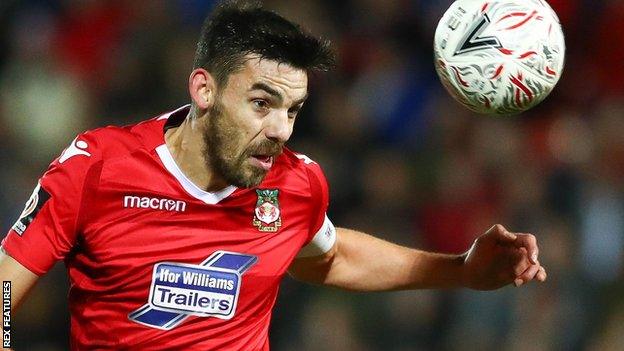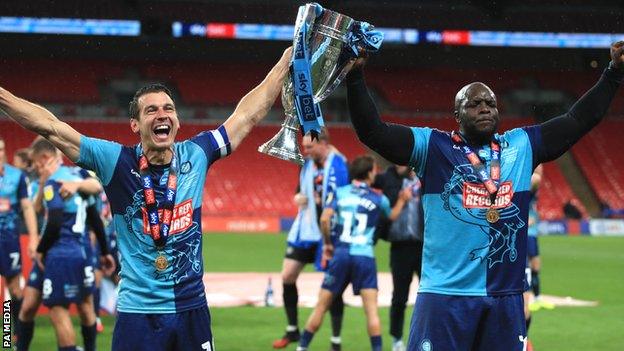Delivering takeaways and supermarket shifts - life in lockdown for a lower-league footballer
- Published

Shaun Pearson has spent the past three seasons with National League club Wrexham
There have been many stories in recent months of football clubs struggling with the financial effects of the coronavirus pandemic.
But what about players and managers? How are they coping and dealing with the most unprecedented time that the sport has possibly ever experienced?
In a special BBC Radio 5 Live programme, some talked about their experiences of life in lockdown.
'You live from contract to contract'
What is the common perception of a footballer? Huge wages, financial security, flash cars, big houses.
While the finances on offer at the very top of the game do allow for players to enjoy that luxurious lifestyle, the picture for those lower down the pyramid is far different.
Adebayo Akinfenwa will play in the Championship for the first time in his career next term, after helping Wycombe win promotion from League One.
The 38-year-old striker said: "I've played for most of my career in the lower leagues so I'm pretty well equipped to talk about it; we know at the end of our career, whether it's two, five or 10 years, we're going to have to work again. It's real life.
"We haven't got the luxury of being in the Championship or the Premier League, which is a totally different world. You kind of live from contract to contract.
"Whatever you're earning, your mortgage still needs to be paid. While you're not being paid, there's only so much in savings you've got left.
"Lower-league footballers have the knowledge that, every year or two years, it is a grind."

Adebayo Akinfenwa helped Wycombe win promotion to the Championship for the first time in their history in July
'Is that the captain of Wrexham delivering my food?'
Shaun Pearson is captain of National League side Wrexham. The Welsh club are fully professional but, like many, furloughed their players after fixtures were suspended in March.
The 31-year-old defender began working as a delivery driver for a local restaurant and also did some overnight shifts in a supermarket to gain some extra income and "keep busy".
He said: "There have been a few deliveries where you turn up, people look at you and think 'is that the captain of Wrexham that's delivering my food?'
"The deliveries went wild but it's calmed down a little bit now because it [the restaurant]has opened back up, inside and outside.
"We donated the tips we got as drivers to the local food bank. It's been nice to help out the community because when we do go back to football, we're going to need the community to come out and support us.
"The one thing you miss from football is being in the dressing room and having that banter. A couple of the boys at Tesco were Wrexham fans and they didn't hold back with their words to me, but all in good jest, and it was just like dressing room banter."
Former Grimsby man Pearson continued: "Because we play football, people look at you and think of the glamorous footballer lifestyle.
"It's the best job in the world, don't get me wrong, but at the same time we don't earn the fortunes that they do in the higher leagues where we can sit and do nothing at home for a few months.
"I'm in my thirties and I'm not naive enough to think that my career's going to go on forever. My opinion is prepare yourself financially as best as you can. I've got two young children that I want to provide for, the best I can."
Football has never been far from the mind, though. Pearson says he and the other captains in the National League are part of a text group where information and advice can be shared with players throughout the division.
National League clubs have been told that the new season is scheduled to begin at the start of October.
'Uncertain time'

Adam Walker won the FA Trophy with his former club Brackley Town in 2018
Adam Walker, 29, combines playing in midfield for National League North club AFC Telford United with his job for a marketing and data solutions company.
He said: "For some of the lads who play non-league, football is their main income and it's worrying for people like them because they're unsure where their next pay packet is coming from.
"Others like me are fortunate to have jobs, but we're still in an uncertain time because you never know what's going to happen with businesses. There's a lot of trying to keep each other going, and checking in to make sure everyone's OK.
"There are a lot of lads having that open discussion (about what to do after or outside football). They're in their mid-twenties and probably didn't expect to be having that chat until their early thirties, but there's a lot of people having that discussion and seeing which way they can go.
"To be honest, it's something a lot of players need to look at because you don't know how many non-league clubs are going to be here. Without the gate receipts and people going through the doors, I don't know how many are going to be able to survive.
"At Telford we've got a great fan base and it's a community club, but at the end of the day if people aren't able to come and watch the games, it's going to be very hard to sustain. We've got a big stadium, there are outgoings and if nobody can go through the door, I'm not sure how they can be paid."